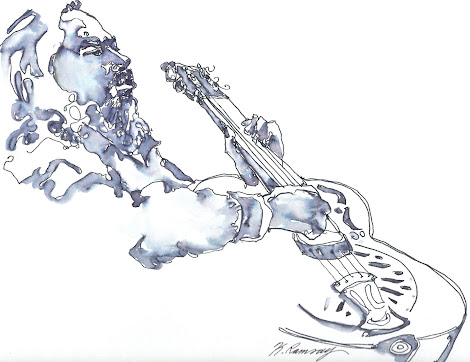 Listening to Steven Wilson's production on Opeth's recent Heritage (review here), it is clear that his recent work remixing King Crimson's catalog has had an impact on his aesthetics. On Grace For Drowning, that effect is more pronounced. Wilson assertively turns away from Porcupine Tree's recent sound to revisit the band's early progressive and art rock roots.
Listening to Steven Wilson's production on Opeth's recent Heritage (review here), it is clear that his recent work remixing King Crimson's catalog has had an impact on his aesthetics. On Grace For Drowning, that effect is more pronounced. Wilson assertively turns away from Porcupine Tree's recent sound to revisit the band's early progressive and art rock roots.With two discs, I'd say that Grace For Drowning sprawls across its 83 minute run-time -- except there's not much fat to trim. The songs are solid and form a coherent whole.
The music on the title cut is a surprise opening for disc 1. Centered on vocal harmony, the backing is a simple set of chords that remind me of a piano exercise. Harmonize vocals are a tool that Wilson uses liberally on Grace, both to create a human warmth and to add a hint of schizophrenia. The jazzy, compositional sound on Grace For Drowning immediately pushes away expectations of Porcupine Tree's normal prog flavor.
Sectarian, the following track, starts out with a guitar conversation, A plaintive acoustic rhythm and a prickly electric melody build a threatening vibe that blows up into a Discipline style darkness. When the vocals and horns kick in, it's revelatory. More twists and turns lie ahead though. While Sectarian isn't quite my favorite track, I love Wilson's artistry with dynamics. He lets the song breathe: controlled inhale and explosive exhale. The mood swings between the different sections show off Wilson's compositional chops.
The first disc closes out with Remainder the Black Dog. The mellow, reflective start sets up an angular piano motif, which builds tension as the other instruments come in. There's some beautiful mellotron work here that riffs against the motif in a freer jam. The theme takes on a Robert Fripp feel as it transitions to the guitar and bass. The pressure increases until the song erupts into wild flailing. Screaming notes whine over the speedy driver, but the track settles back into the jam. It's a wonderful, progressive roller coaster.
Disc two shows more of the King Crimson/early Porcupine Tree influence. Track One starts out with a forlorn opening vocal and a taste of I Talk To The Wind, but the song transitions through a brief manic section before turning darker. Like the amorphous flow of dream-time events, the song drifts in several directions. The darkness fades into a surprising guitar solo that evokes some of Jerry Garcia's moodier ramblings.
This sets up the epic length of Raiders II. The ponderous opening offers little hint of trip to come. Despite elements of Court of the Crimson King and 21st Century Schizoid Man, it's pure Steven Wilson. The dynamic shifts can be razor sharp, but still natural. When it drops from headlong rush to a meandering melody against a sparse backing, it's unpredictable but satisfying. Wilson's balance between openness and contraction, between direction and loose drifting, makes Raiders II the showpiece of Grace.
Aside from the retro prog foundation of the album, Grace For Drowning has more accessible sounds than Porcupine Tree's material, like the early Genesis style of Deform To Form a Star or the string and piano backed Pastcard. Hopefully, this will open Wilson up to some wider public appreciation. In turn, this could introduce progressive music to a greater audience.

No comments:
Post a Comment